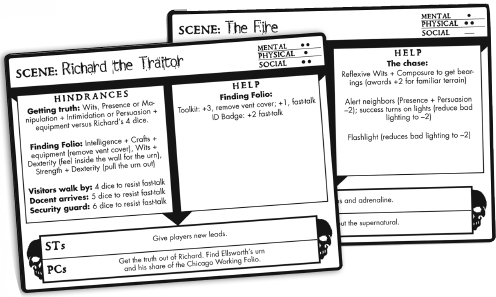Here's a little tidbit that Microscope taught me: every scene has a particular question (or questions) associated with it. When that question is answered, the scene is over.
You want to skip over scenes with questions that are uninteresting, and jump to the ones which are interesting, and that's exactly what you did.
This is why nobody runs games with scenes in which the players are just sleeping: there's no interesting question being answered. I can safely say that no player wants to play a game in which they uneventfully watch their character sleep. Even if something does happen in the middle of the night, the game will jump directly to that, rather than dawdle over how long the players slept.
The question "How did we make friends with this NPC?" isn't really interesting if you already know the answer is just "small talk." It takes a rare kind of player to be interested in that question, so most of the time, it's safe to skip. The questions "Where did we learn about the ultimate result, and how did we respond to it?" are interesting questions (to your group), and deserve playing out as a scene.
In other words, your ultimate goal as a GM is to find scenes that develop parts of the plot that intrigue the players. If your players all happen to be the rare kind that enjoy playing out small talk conversations, then as a GM, it's your responsibility to give them that to develop an enjoyable game. But, if you judge that they wouldn't enjoy such a scene, it's equally your responsibility to skip over it and jump to something more interesting.
So, here's my process, and it's really quite simple for the most part:
- What question are we answering with a scene?
- Is that question going to be interesting to the players?
- If yes, run it.
- If no, does it contain information that is necessary to the progression of the game?
- If it does not, then don't run it.
- If it does, run it minimalistically - you know it's not interesting to the players to dawdle over, but it's a little necessary, so gloss over it and get to the important stuff so you can move on to a scene whose answer is 'yes.'
What if there isn't an explicit question I can think of?
I can guarantee every scene has a goal in mind. Even if it's just players attacking the entrance to a cave, the question is "How did we gain access to the cave?" - and this question should be played if the players want it.
That being said, if you really can't think of a good question (or set of questions) that represents what the PCs are doing, then there's an abstraction to this process, which is simply, will the players enjoy this scene? Note that this doesn't exactly help you determine what useful information comes out of the scene, but it still works as an abstraction in most cases.
Does this mean I literally have to stop the scene once the question is answered?
While in Microscope, this does indeed literally means we stop playing the scene, this approach doesn't work in every game. It's fully possible - and encouraged, for continuity - for you to move from one question to the next in the same scene.
For instance, imagine a scene between players and the king. The players start out with the question "Why did the King of Wisconsia summon us here?" - and let's say the king is a straightforward person, so immediately tells them the answer: "To destroy the goblin hordes." This doesn't mean the scene is over, but instead, means the players have another question: "How does the King expect us to defeat the goblin hordes?"
You end the scene when the players have no more questions of interest to answer, and at that point, move onto the next scene.

